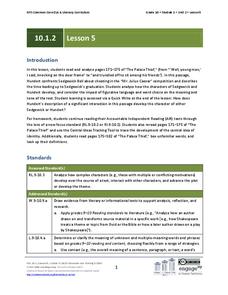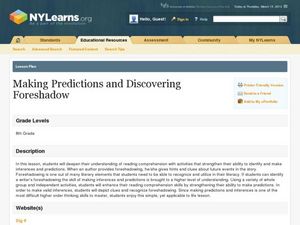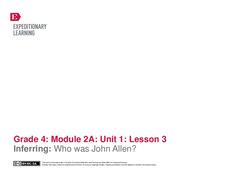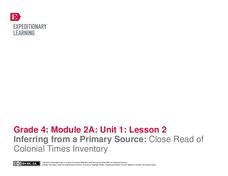Curated OER
Teach Inferences in a Systematic and Engaging Way
Benefit from specially designed materials to help you teach inference in a systematic and rewarding way!
Curated OER
Mini-Lesson Planning for Inferences
Making inferences and drawing conclusions is a key component to successful active reading. Encourage your class to use context clues and prior knowledge to infer different elements of a story, including the setting, plot, and character...
K12 Reader
What Do You See? (Inferences)
Making inferences is a skill that goes beyond the comprehension of written text. In this simple exercise, young learners are provided with a photograph and asked to answer a series of inference questions using only on the...
E Reading Worksheets
Predictions Reading into the Future
Practice making inferences about fiction with a language arts slide show presentation. After kids read a few tips about ways to predict the next event in a story, they read several passages and try to find out what will happen next based...
Curated OER
Express Yourself Lesson Seed 12: Story Event
Focus on plot and the impact-specific events in The Cay. Class members use their double-entry journals, created in a previous lesson in this series, to record their thinking about the guiding question as they read chapters 15 through 17....
EngageNY
Grade 10 ELA Module 1: Unit 2, Lesson 5
Readers of "The Palace Thief" focus on how the author's descriptions and word choices reveal the characters of the narrator, Sedgewick, and the senator.
Curated OER
Foreshadowing and Making Predictions
"What happens next?" Using real-life scenarios, movies, images, and other prompts, pupils practice making predictions based on inferences from clues. A SMART board activity takes them from making predictions to writing a prediction...
Curated OER
Comprehension Strategies: Drawing Inferences
The proof is in the details! A richly detailed plan provides clear examples of how to draw inferences from text and how to provide support drawn directly from the text.
EngageNY
Taking Notes Using a Graphic Organizer: Inferring About Work and Play in Colonial America
What was life like in colonial America? Follow this lesson and your pupils will find out what people in colonial times did for work and for fun. Ask learners to compare and contrast the two texts and explain what the reading helped them...
EngageNY
Taking Notes Using a Graphic Organizer: Inferring About the Importance of Religion in Colonial America
Improve class understanding of colonial times by reading an informational text and filling out the accompanying graphic organizer. Class members work with a partner to read, take notes, make inferences, and synthesize information.The...
Curated OER
Foreshadowing and Prediction: W.W. Jacob's, "The Monkey's Paw"
W.W. Jacobs' story "The Monkey's Paw" provides plenty of foreshadowing which readers use to make predictions in this tightly composed, sound instructional plan. Your class reads the story, recording predictions and checking for veracity...
Bethel School District
Observations and Inference
What's the difference between qualitative and quantitative observations? Learners make observations, inferences, and predictions about their environment with a set of questions and activities that are applicable to either language...
Curated OER
Making Inferences about Problem and Solution
Students use unfamiliar objects to make inferences. In this making inferences lesson, students make guesses about what an item does. Students brainstorm together and make lists of ideas and write them on index cards. The teacher gives...
K20 LEARN
OPTIC - A Reading Strategy Recipe: Visual Literacy
A visual literary lesson provides learners with OPTIC (Observations, Predictions, Themes, Inferences, Conclusions), a reading strategy to help them understand and interpret visual and written texts. Scholars practice the strategy with a...
National Park Service
A Tale of Two Men
Theodore Roosevelt and the Marquis de Mores were both born in 1858, and both came to the Dakota territory in 1883, but they influenced the developing country of America in different ways. Elementary and middle schoolers apply written and...
Curated OER
Build Mastery: Making Inferences
Do your youngsters realize that they are constantly making inferences? Expose this inner process by bringing out the book they will be reading. Ask scholars what they think the plan is, and explain that their answers are the product of...
Curated OER
Making Inferences - An Introduction
Help your learners identify the inferences they make every day with this SMART board activity. With a comic strip in the first presentation slide, they make inferences about the situation. A discussion addresses what type of prior...
EngageNY
Inferring: Who was John Allen?
Help your learners work with difficult or archaic words. A continuation of lesson two of this module, the plan here focuses on deciphering the Inventory of John Allen, in particular the unfamiliar words that make up much of the list. Add...
Curated OER
Archeology Lesson; Making Inferences
Students discover what an archeologist is and make inferences about societies and cultures based on artifacts. In this archeology lesson, students complete an array of captivating activities, guessing about what an artifact is...
EngageNY
Inferring from a Primary Source: Close Read of Colonial Times Inventory
Teach your class about colonial America through an examination of primary documents. First though, start vocabulary notebooks for content-specific and academic vocabulary. Pupils can keep this record during the entire module. Once this...
K12 Reader
Visual Clues
Whether you realize it or not, reading an image and reading a text require similar skills, including the ability to make inferences. For this simple worksheet, children look at a picture of a snowy winter day and answer a series of...
West Corporation
Making Inferences – Use Your Mind to Read!
How can you tell if someone is happy? The lesson works with elementary and middle school scholars to activate their schema and pay attention to details to make inferences in their daily lives, poetry, and other literature. Cleverly...
Curated OER
Mini-Lesson: Planning for Inferences
The five lessons in this resource are designed to teach class members how to read between the lines, how to use personal experience/background knowledge/schema, along with the information in the text, to make assumptions about...
Roald Dahl
George's Marvelous Medicine
Six lessons comprise a unit about Roald Dahl's George's Marvelous Medicine. Over time, scholars explore themes such as the power of words, exciting writing, and mixed feelings. They examine the writing's literary devices, persuasive...























